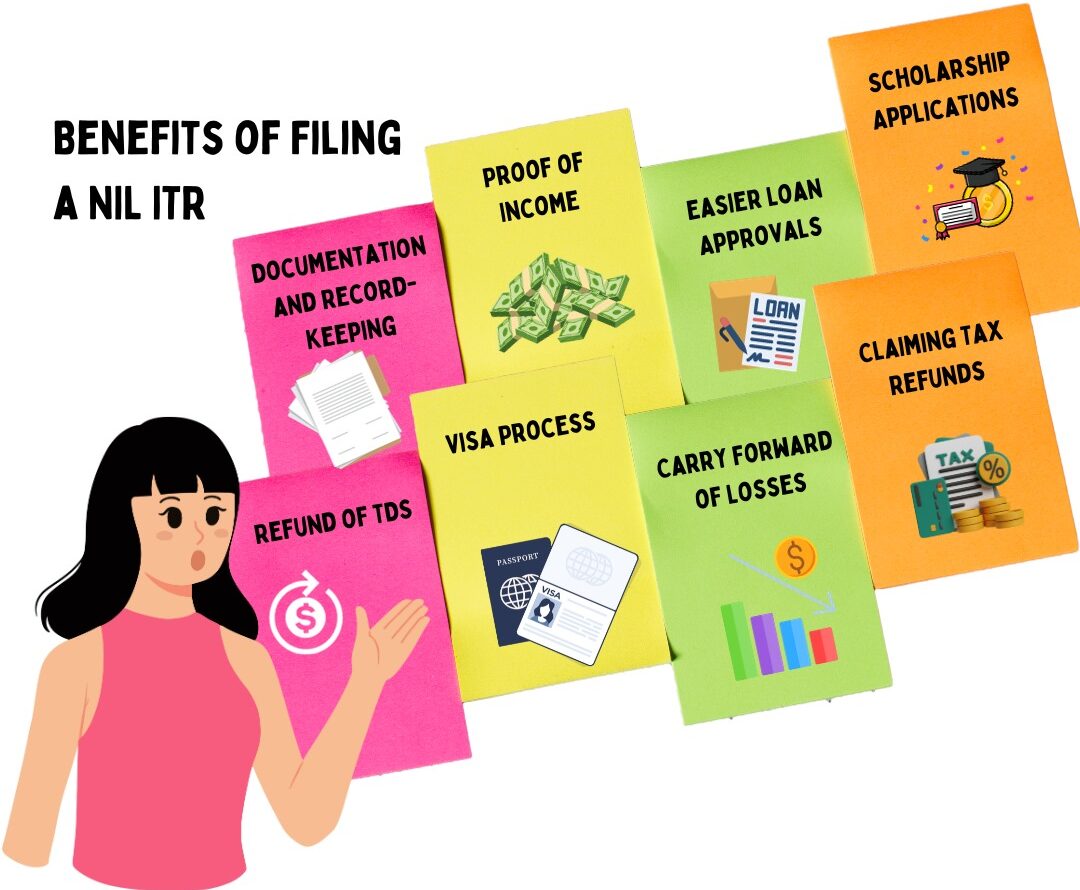Nil ITR: What is Nil ITR, Steps to file A Nil ITR & Benefits of filing a NIL ITR

Have you ever wondered what happens when your income slips beneath the taxation radar? Filing income tax returns is a fundamental financial responsibility, and sometimes, it leads us down the path of the Nil ITR, or Nil Income Tax Return.
This intriguing facet of taxation comes into play when an individual’s income doesn’t trigger any tax liability, either because it falls below the basic exemption limit or as a matter of personal choice.
In this article, we’ll delve into the concept of Nil ITR, explore the steps involved in filing one, and uncover the numerous advantages it brings to the table.
What is a Nil ITR?
A Nil ITR, or Nil Income Tax Return, is a specific type of income tax return filed when an individual’s income doesn’t result in any tax liability. This situation can occur when:
- The individual’s income is below the basic exemption limit, which is currently Rs 2.5 lakh in India.
- Even if the income is below the taxable limit, individuals choose to file a Nil ITR voluntarily.
Steps to File a Nil ITR
- Filing a zero-tax ITR doesn’t necessitate a special request; the procedure mirrors that of a standard ITR submission. You can conveniently file a zero-tax ITR online via e-filing.
- Before commencing, ensure you have the following information at hand:
- PAN
- Aadhaar
- Bank account
- Salary particulars
- Form 16
- Investment details (if applicable)
- Visit the official website of the Income Tax Department and log in using your registered user ID and password.
- Choose the e-filing option. Input and submit your income and deduction details. Your income tax will be automatically calculated, indicating that you owe no taxes.
- Submit your return to the Income Tax Department and dispatch your ITR-V to CPC Bengaluru to finalize the e-filing process.
Benefits of Filing a NIL ITR
Here’s why filing a Nil ITR can be beneficial
- Documentation and Record-Keeping: It helps maintain a documented record of financial transactions and income details. This record can be valuable for future reference or potential audits.
- Proof of Income: A Nil ITR serves as proof of income, even if the income is below the taxable limit. This proof can be useful when applying for loans, visas, or other financial transactions that require income verification.
- Easier Loan Approvals: Income tax returns serve as authenticated income proof, making it easier to obtain loans from lending institutions. It establishes creditworthiness, an essential factor in the loan approval process.
- Scholarship Applications: Some scholarships may require students to submit income tax return proofs, and filing a Nil ITR can support scholarship applications.
- Refund of TDS: If a taxpayer didn’t submit Form 15G/H to prevent TDS deductions, filing a Nil ITR allows them to claim a refund of the TDS amount deducted by financial institutions.
- Visa Process: Filing Nil returns can aid visa or credit card applications by providing proof of income.
- Carry Forward of Losses: Individuals can carry forward capital losses, business losses, or other losses incurred during the financial year by filing a Nil ITR. These losses can be set off against future taxable income, reducing tax liability in subsequent years.
- Claiming Tax Refunds: In some cases, individuals may have paid taxes deducted at source (TDS) or self-assessed tax, even if they fall under the NIL income category. By filing a Nil ITR, individuals can claim a refund of the excess tax paid.
Filing a Nil ITR is a valuable practice as it establishes a record of income for a specific financial year, even when it’s not subject to income tax.
This record can provide peace of mind and support various financial transactions and applications.
In the intricate world of taxation, the Nil ITR emerges as a silent yet significant player, offering individuals a valuable tool for financial documentation, income validation, and numerous other perks.
While it might seem like a formality for those with no tax liability, its benefits extend far beyond that, including aiding in loan approvals, scholarship applications, and even the reclaiming of overpaid taxes.
Thus, as you navigate the labyrinth of fiscal responsibilities, remember that filing a Nil ITR can be a smart move, ensuring your financial house is in order and ready for whatever the future may hold.







